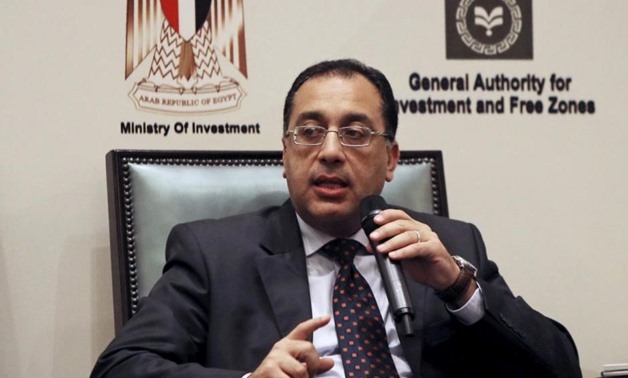
Egypt's newly-named Prime minster Mostafa Madbouly talks at Egypt Mega Projects MEED Conference in Cairo, Egypt, December 8, 2015. REUTERS/Mohamed Abd El Ghany
CAIRO – 7 June 2018: Minister of Housing and Urban Utilities, Moustafa Madbouly, has been named as Egypt’s new prime minster by President Abdel Fatah al-Sisi as a successor to Sherif Ismail.
CAIRO - 7 June 2018: President Abdel-Fatah al-Sisi appointed on Thursday Minister of Housing and Urban Utilities Moustafa Madbouly as the new prime minister, to be successor to Sherif Ismail, according to a statement from Presidential Spokesperson Bassam Radi On Tuesday, Sharif Ismail submitted the resignation of his government only two days after President Sisi was officially sworn in as the head of state for a second term until 2022.
Madbouly, 52, has preserved his position as minister of housing and urban utilities since 2014. He served with two following prime ministers, including Ibrahim Mahlab until September 2015 and with Ismail from September 2015 until June 5, 2018.
On June 5, Egypt’s Prime Minister Ismail submitted the resignation of his government only two days after President Sisi was officially sworn in as the head of state for a second term until 2022, according to presidential spokesperson, Bassam Rady.

FILE-President Abdel Fatah al-Sisi talks with newly appointed Prime Minister Moustafa Madbouly
Madbouly’s selection however wasn’t a surprise as he was Sisi’s first choice to lead the government last November when former Prime Minister Ismail had jetted off to Germany for a surgery. Ismail returned to his post later in January 2018.
The newly-named prime minister held several positions before joining the government, including being the regional director for Arab countries at the United Nations Human Settlements Program -Habitat- from November 2012 until February 2014.
From September 2009 until November 2011, Madbouly was the chairman of the General Authority for Urban Planning at the Ministry of Housing, Utilities and Urban Development; he also was the executive director of the Training and Urban Studies Institute at the Housing and Construction Research Center at the Ministry of Housing.
Madbouly got his masters and PhD from Faculty of Engineering, Cairo University, in 1988 and 1997, respectively. During his tenure as housing minister, Madbouly succeeded to implement several national projects of social housing to help eliminate the slums in Egypt.
The “million housing units” was one of the major national projects that came into force after President Sisi took office, though the project was former Housing Minister Mohamed Fathy al-Baradei's idea. For political and social reasons, the project, which was suggested by Baradie in 2011, stopped during the Muslim brotherhood era, and came into force again when Madbouly took office.
This project, of which several stages have already been completed, is considered to be the largest project specialized for Egyptians with low-income. More than 500 contracting companies are working on the project.
Besides providing low-income citizens with suitable housing units, this project provided about 750,000 direct job opportunities and another 2 million indirect opportunities. On December 2017, the Housing and Urban Utilities Ministry founded a specialized fund to maintain the project's sustainability. It was announced that the social housing project will not end by finishing the 1 million housing units.
Regarding the elimination of slums, several projects have been recently implemented to accomplish that goal, including Tal Al Aqareb area in Sayeda Zeinab, Ahlina slums in Al Salam 1, Al Mahrousa 1, Al Salam slums, Manshiyet Nasser, El Asmarat District in Mokattam, and Maspero Triangle.

Slums where people used to live in before being displaced to Asmarat - File Photo
The Ministry of Housing estimated that 40 percent of Cairo's population lives in informal settlements, while the Informal Settlements Development Fund (ISDF), now part of the new Ministry for Urban Development, estimates that 75 percent of urban areas throughout Egypt is unplanned and 1 percent is unsafe.



Comments
Leave a Comment